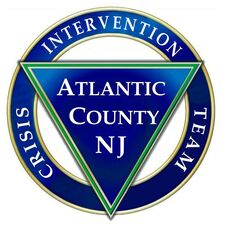Fall 2023 CIT Classes
October 23-27, 2023 Zion Lutheran Church Egg Harbor City
November 27-December 1, 2023, Caesars Hotel & Casino, AC
Classes run Monday- Friday 8:00 am – 5:00 pm
October 23-27, 2023 Zion Lutheran Church Egg Harbor City
November 27-December 1, 2023, Caesars Hotel & Casino, AC
Classes run Monday- Friday 8:00 am – 5:00 pm
|
Registration for CIT classes
|

Atlantic County CIT
The CIT model, known as the "Memphis Model" was first developed in 1988 and has spread throughout the US and is now international. At the core is an evidence based 40-hour training program designed to prepare a select group of patrol officers to continue their patrol duties with a specialization in assisting people in crisis. Officers learn how to identify and most effectively respond to mental health crisis situations, divert individuals from the criminal justice and juvenile justice systems when appropriate, and help individuals access local mental health services.
The Crisis Intervention Team (CIT) program is a community partnership of law enforcement, mental health professionals, individuals who live with mental illness and/or substance use disorders, their families, and other advocates. It is an innovative first-responder model of police-based crisis intervention training to help persons with mental disorders and/or substance use disorders access medical treatment rather than place them in the criminal justice system due to illness-related behaviors. It also promotes officer safety and the safety of the individual in crisis.
- CIT focuses on responses to mental health crises. CIT is not just about how law enforcement responds to mental health crisis situations. It also addresses how mental health professionals and other supporters are involved in crisis response. CIT examines how systemic problems—like outdated policies or a lack of services— contribute to crisis situations and develops solutions to these systemic challenges.
- CIT is community-based and improves community responses to mental health. The most visible faces of CIT are CIT officers, but CIT is not a law enforcement program. CIT is designed to bring mental health professionals, advocates, elected leaders, and others to the table to problem-solve and take responsibility for improving the mental health crisis response system—so that police and jails are not the default responders and locations. CIT programs work to build crisis response systems where law enforcement plays a supporting role and responds only when the level of danger or criminal activity warrants such a response. CIT programs also work to strengthen locations in the community where community members can walk in and receive the help, they need without contact with the justice system.
- CIT includes people living with mental health disorders and their families. No one has a greater stake in the outcome of a mental health crisis than the person in crisis, followed closely by their family members. These stakeholders also have valuable insight into how the crisis response system works and what helps make it better. Only by engaging individuals with mental illness and their families can we build crisis response systems that people feel confident reaching out to in a crisis without fear of danger or incarceration.
- CIT is based on partners coming together. CIT partners are equal decisionmakers who solve problems together, bring resources to the table, and hold each other accountable. Mutual commitment, trust, and respect are the bedrock of strong partnerships.
- CIT focuses on responses to mental health crises. CIT is not just about how law enforcement responds to mental health crisis situations. It also addresses how mental health professionals and other supporters are involved in crisis response. CIT examines how systemic problems—like outdated policies or a lack of services— contribute to crisis situations and develops solutions to these systemic challenges
- Link to CIT Drive with resources and past meeting minutes etc;
|
Mental Health Association in New Jersey, INC (MHANJ) makes every effort to post accurate and reliable information, however, it does not guarantee or warrant that the information on this Website is complete, accurate or up-to-date. This Website is intended solely for electronically providing information and convenient access to resources. All information is subject to change at any time without notice.Links to external websites are limited to State and Federal agencies and/or State and federally funded local programs. The existence of a link to any of these programs shall not constitute an endorsement of such program by the MHANJ.Unless otherwise noted on an individual document, file, Web page or other item, MHANJ grants user’s permission to reproduce materials published by MHANJ on this Website so long as MHANJ is noted as the source, and the date the Web page was accessed, along with the date of publication of the material cited, is noted. All copyright and other proprietary notices must be retained in the same form and manner as on the original and the contents may not be modified in any way. The user agrees to abide by all additional restrictions provided on this site as it may be updated from time to time.

